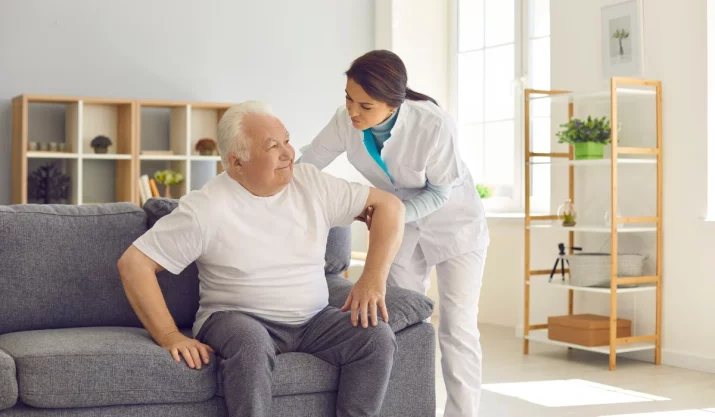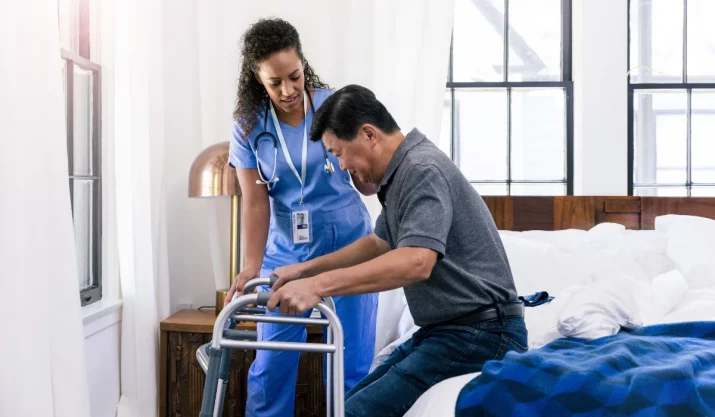10 Energy-Boosting Strategies That Every Senior Should Know

Table of Contents
Nearly one-third of adults over 50 experience fatigue on a regular basis. If you’ve experienced a change in your energy levels with aging, you’re not alone. While your chronic fatigue may be the result of an underlying health condition, often there are simple lifestyle changes that can help alleviate your tiredness.
Read on to learn the best strategies when it comes to boosting your energy levels as a senior.
Key Takeaways
- Diet, exercise, and a good night’s sleep are all paramount when it comes to maintaining wellness and energy levels for anyone, especially senior citizens.
- Brain health is also important for energy –getting in a stimulating mental workout is just as important as a physical workout.
- Managing your stress, keeping an active social life, and looking out for your mental health are important if you’re looking to increase energy.
- Schedule regular medical check-ups in order to ensure your body is functioning properly and to catch the causes of any changes in energy levels.
1. Prioritize Sleep
Prioritizing sleep hygiene and getting enough sleep is one of the best ways to stay energized and combat aging. Senior citizens need about seven to nine hours of sleep, just like all adults, but many older people tend to skimp out on sleep, whether it’s due to feeling sick, side effects of medication, or a strain on mental health. In fact, insomnia is the most common sleep problem in adults 60 and older.
Losing sleep can become a vicious cycle, leaving you irritable, depressed, more likely to fall or get into physical accidents. It can also cause memory problems. In order to improve the quality of your sleep, here are a few pointers to maintain a regular sleep schedule:
- Avoid napping in the afternoon, and develop a soothing nighttime routine.
- Keep screens (i.e. TVs, phones, tablets) out of your bedroom and keep your room cool and dark.
- Make sure to exercise during the day, but not too close to bedtime.
- Avoid eating large meals close to bedtime (but don’t go to bed hungry either).
2. Stay Hydrated
Getting in one-third of your body weight in ounces of fluids per day is crucial for a number of bodily functions, from keeping joints lubricated to keeping blood pumping to the heart. But senior citizens are more prone to dehydration for a number of reasons, one being a diminished sense of thirst that comes with age.
Drinking plenty of water will keep you energized and alert, while dehydration can cause headaches, muscle cramps, irritability, confusion, and more.
In order to keep your water intake in check, consume more hydrating foods (i.e. cucumber, watermelon, lettuce), carry drinking water with you at all times, and limit your consumption of diuretics like alcohol.
3. Maintain a Healthy Diet
Maintaining a healthy, balanced diet is one of the most important factors in healthy aging and as a means to boost energy levels. It’s crucial to keep your diet varied and eat from a variety of food groups in order to prevent disease (i.e. heart disease, diabetes, high blood pressure).
Packing in lean protein will keep you energized and give your muscles a boost while preventing functional impairment (0.8 grams per kilogram of body weight per day will suffice).
Always include fruits and veggies in your meals, incorporate healthy carbs (i.e. whole grains), limit sodium intake where possible (try seasoning with herbs or citrus instead), and consult your doctor about which vitamin supplements might be right for you to combat low energy levels.
Vitamin B12, a natural energy booster found in meat and fish, is likely a good idea, as is vitamin D, found in fish and absorbed via the sun, and magnesium, found in nuts and seeds, beans, and greens.
4. Exercise Regularly
Regular aerobic exercise is crucial for your health and maintaining muscle mass, and can help keep you energized throughout the day.
It’s recommended that older adults incorporate 150 minutes of moderate endurance activity into their weekly routine. If this amount of exercise seems overwhelming, try breaking it into 10-15 minute chunks (i.e. two 15 minute walks during the day).
Incorporating training for strength, balance, and flexibility will improve your sleep and mental alertness while keeping you physically fit and decreasing the risk of disease.
5. Manage Your Stress
Fatigue in older adults is often linked to stress, whether it’s from financial or personal struggles, grief over the loss of loved ones, anxiety, depression, or the feeling of a loss of control over your life. Holistic techniques like yoga, tai chi, meditation, and deep breathing exercises may help relieve some stress and help you gain clarity.
Therapy and medication are also great options to help cope with mental health struggles. Ask for help from your support network if you feel overwhelmed, and try participating in volunteering or recreational activities you enjoy.
6. Limit Caffeine and Sugar
Overconsumption of caffeine or sugar can often affect your energy levels. Drinking more than 400 milligrams of caffeine per day can cause you to experience an energy “crash” or become too reliant on the drug.
Keep in mind that caffeine is not just in coffee, tea, and energy drinks, but also other things you may be consuming regularly, like chocolate or Excedrin migraine medication.
Similarly, consuming too much sugar (and processed sources of carbohydrates) can cause a sudden drop in blood sugar levels, creating an energy “crash.” This is why it’s crucial to monitor your daily sugar intake. The American Heart Association recommends that men consume no more than nine teaspoons of sugar per day, and women consume no more than six teaspoons of sugar per day.
7. Break Up Tasks
If you’ve been stressed out when it comes to work or personal responsibilities, your energy may be drained, making it more difficult to complete those daily tasks. In order to break this cycle, try breaking down your work into less intimidating chunks and taking frequent breaks. Giving yourself breaks throughout the day can help with stress and time management and significantly reduce anxiety levels.
8. Socialize
A study conducted at Harvard Medical School found that senior citizens with active social lives had higher levels of physical activity, less negative feelings, and more positive moods. Humans are social creatures, but as we approach retirement and disconnect from communities and activities we used to enjoy, we may find ourselves isolated or lacking in terms of social time.
It’s crucial to make time for friends and family and to participate in recreational activities in order to keep your energy levels up. Not only does socializing reduce the chance of dementia, anxiety, and depression, it’s also linked to a longer lifespan, reduced stress, better physical fitness, and even improved self-esteem.
9. Stay Active Mentally
Keeping your brain active is one of the best ways to keep it alert and energized. Maintain your cognitive health by engaging in brain games (i.e. logic puzzles, sudoku), reading, learning a new language, or even taking a community college class.
Keeping your brain stimulated, even when you’re no longer engaging in work or recreational activities at the level you’re used to, will help boost your energy levels and prevent cognitive decline. Even playing a card game or board game, cooking, or doing a simple task using your non-dominant hand can count as a brain workout.
10. Regular Medical Check-Ups
Attending your annual physical and any other necessary health care check-ups is crucial not only for your health, but also for keeping your energy levels in check.
Having annual blood work done will let you know of any nutritional deficiencies that may be causing your energy to spike or slump.
Hormonal metabolism tests can also provide similar insight on how your body is working. If any abnormalities or medical issues are causing your energy levels to change, it’s important to catch them early! Going to the doctor is the pinnacle of self-care when it comes to monitoring your health as you age.
What Does An Expert Say?
We asked an expert to provide some pointers on how to boost your energy levels, and this is what they said.
“Even though it may be the very last thing you feel like doing when tired, exercise and movement are crucial for boosting energy levels. Exercise triggers certain changes in the body that improve its ability to use oxygen and glucose, and increase energy levels. Start with just a simple walk around the block, or even down to the driveway if that seems like too much.
Build up slowly over time and you’ll see your energy levels improve! Of course, don’t forget to speak with your doctor before beginning any new exercise routine to make sure that it is appropriate for you and your specific health needs.” – Nicole Galan, MSN, RN








